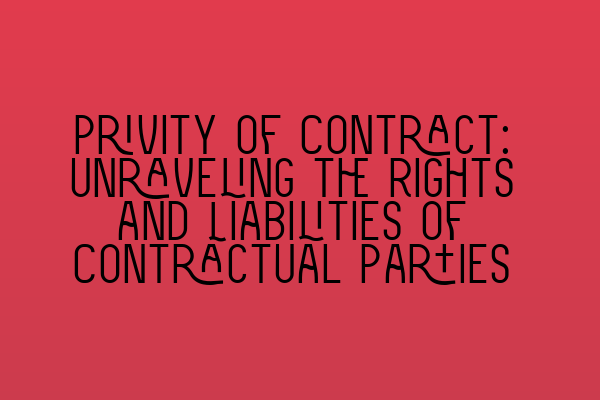Privity of Contract: Unraveling the Rights and Liabilities of Contractual Parties
When entering into a contract, it is essential to understand the concept of privity of contract. Privity of contract refers to the relationship between the parties to a contract and the rights and liabilities that arise from that relationship. It determines who can enforce the contract and who is bound by its terms.
In this article, we will delve into the intricacies of privity of contract, exploring the rights and liabilities of contractual parties and shedding light on the importance of this concept in contract law. We will also discuss the evolving landscape of privity of contract and its implications in the modern legal landscape.
Understanding Privity of Contract
Privity of contract establishes the direct relationship between the parties to a contract. It dictates that only those who are parties to a contract can enforce its terms. This means that a third party, who is not a party to the contract, generally cannot enforce any rights under or be bound by the contract.
This concept is crucial in protecting the autonomy and freedom of contract between the parties involved. It ensures that each party is only bound by the obligations they have agreed to and guarantees that they have the right to enforce any rights granted to them under the contract.
Rights and Liabilities
Privity of contract defines the rights and liabilities of the parties involved. The rights derived from a contract are enforceable only by the parties to that contract. This means that if party A enters into a contract with party B, party C (a third party) cannot enforce any rights arising from that contract.
Similarly, the liabilities arising from the contract are borne only by the parties to the contract. If party A breaches the contract with party B, party C cannot hold party A liable for their actions unless they have a separate contractual relationship with party A.
However, there are exceptions to the rule of privity of contract. These exceptions mainly arise when legislation or common law allows third parties to benefit from or be bound by a contract. Some of these exceptions include the assignment of rights, the rule in Dunlop v Selfridge, and the doctrine of collateral warranties.
The Evolving Landscape
The concept of privity of contract has undergone significant changes over the years. The need to protect the rights of third parties and promote commercial transactions has spurred the development of exceptions to the privity rule.
For instance, under the Contracts (Rights of Third Parties) Act 1999, a third party can enforce contractual rights if they are specifically identified in the contract, or if the contract expressly provides for their enforceability. This has expanded the scope of privity, allowing certain third parties to have a direct interest in the contract.
However, it’s crucial to note that the exceptions to privity of contract can vary depending on the jurisdiction and the specific circumstances of the case. It is imperative to seek legal advice to understand the implications of privity in your jurisdiction and ensure compliance with the applicable laws and regulations.
The Importance of Privity of Contract
Understanding privity of contract is vital for both solicitors and their clients. As a solicitor, it is your responsibility to effectively advise your clients on the legal implications of their contracts. By understanding privity, you can guide your clients in structuring their contracts to protect their rights and manage their liabilities.
For clients, comprehending privity allows them to have a clear understanding of their contractual relationships, rights, and obligations. It enables them to make informed decisions and seek appropriate remedies in case of contractual disputes.
In conclusion, privity of contract serves as the foundation of contractual relationships. It outlines the rights and liabilities of the parties involved and ensures that only those who are parties to a contract can enforce its terms. While exceptions to privity exist, it is essential to seek legal advice to navigate these complexities and ensure compliance with the applicable laws and regulations.
For more information on SQE exams and contract law, please check out these related articles:
